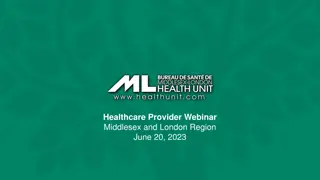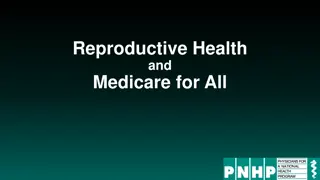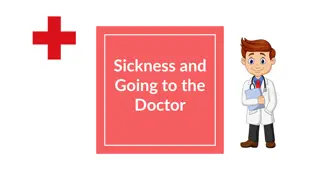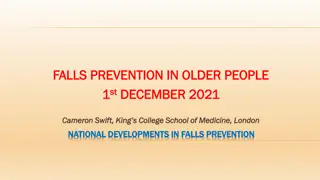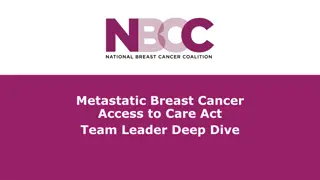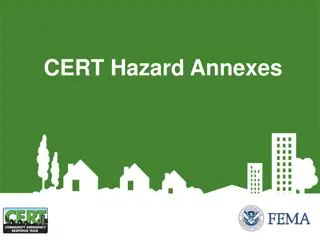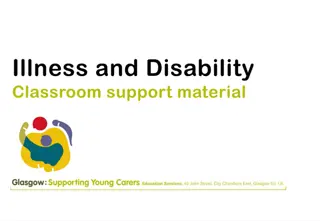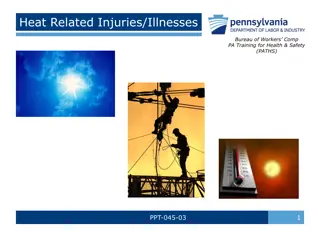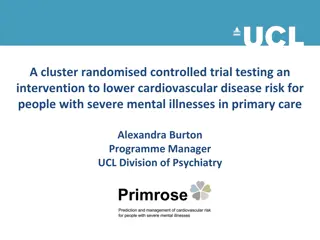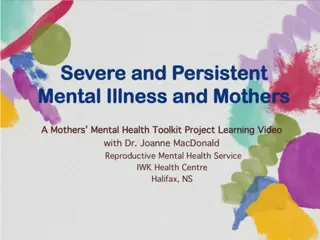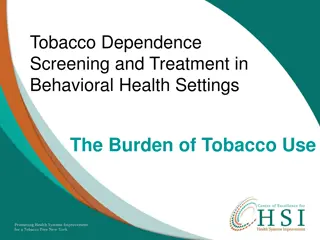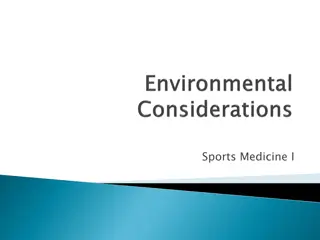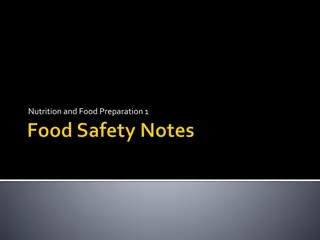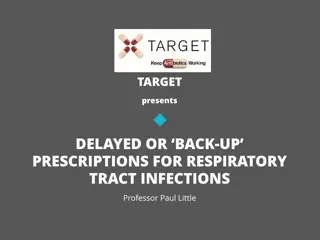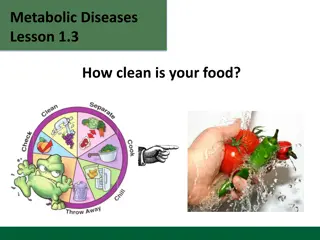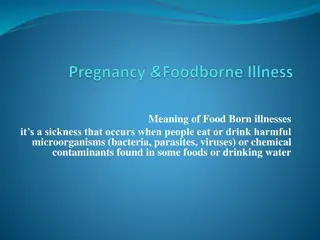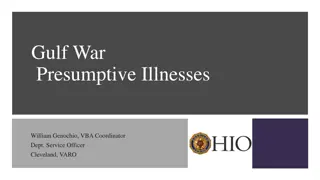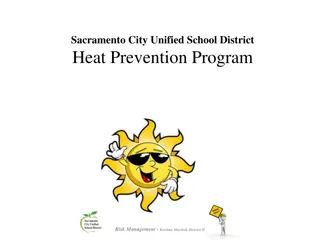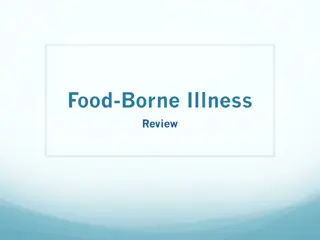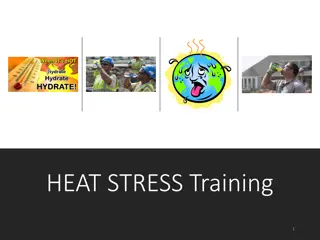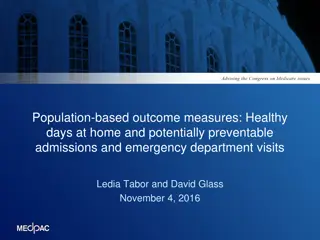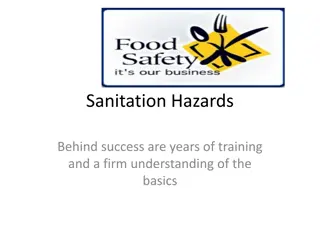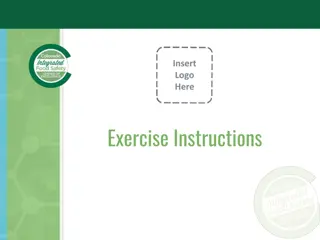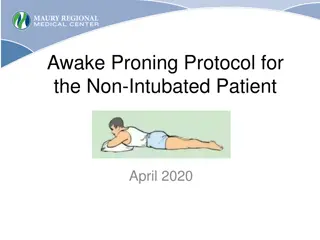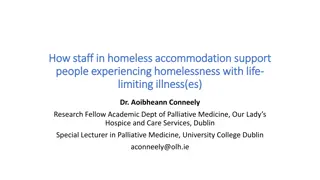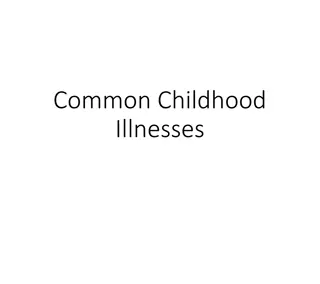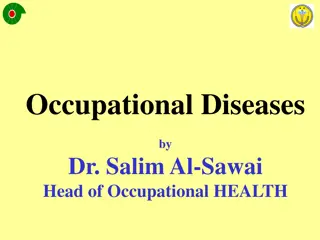Recent public health emergency trends in Africa
The recent public health emergency trends in Africa, as highlighted by Ayesha Kadir from Save the Children, reveal concerning issues such as climate change exacerbating crises, collective violence affecting communities, and millions of children dying annually from preventable causes. The Greater Hor
0 views • 11 slides
Healthcare Provider Webinar: Updates on TB Surveillance & Vaccination Errors
Explore the latest updates on TB Immigration Medical Surveillance in the Middlesex-London region and changes to the program. Learn how to manage TB assessments for low-risk clients and get insights on the Vaccine Preventable Disease Team's special presentation on immunization errors. Enhance your kn
0 views • 20 slides
Impact of Evidence-based Supported Employment on Health and Social Determinants
Providing evidence-based supported employment can positively impact social determinants of health by addressing economic stability, reducing risk factors for preventable illnesses, and improving access to quality healthcare. Employment plays a crucial role in mental health intervention and can help
3 views • 36 slides
Challenges in Reproductive Health and Maternal Care in the U.S.
Reproductive health and maternal mortality rates in the United States have raised concerns, with significant disparities across racial and economic lines. Maternal mortality has surged, with preventable deaths comprising a high percentage. Financial barriers hinder access to care, leading to skipped
0 views • 28 slides
Common Illnesses and Health Advice
Explore various common illnesses like flu, fever, headache, cold, and their symptoms through images. Learn how to describe illnesses using verbs and match symptoms with the right illness. Additionally, discover health advice using "should" and "shouldn't" with appropriate illnesses.
1 views • 18 slides
Models and Concepts of Disability: Understanding the Disability Process and Components
Exploring various models and concepts of disability, this content delves into the disability process, including definitions, components, and interactions outlined by Nagi, IOM, and the ICF model. It highlights the perspective that disability is not inherent to the individual and can be preventable a
0 views • 24 slides
Falls Prevention in Older People: Key Concepts and Strategies
Falls prevention in older people is crucial due to the high prevalence of falls in this age group, leading to injuries, disabilities, and increased healthcare costs. Key concepts include recognizing falls as a significant threat in later life and identifying intrinsic and extrinsic factors contribut
1 views • 33 slides
Making Informed Vaccine Decisions for Your 2-Month-Old Infant
Congratulations on your infant reaching 2 months! Learn about the importance of vaccines and how to make informed decisions regarding vaccinating your baby. Access valuable resources from CDC to understand vaccine benefits and risks. Still unsure? Get familiar with vaccine-preventable diseases and h
0 views • 14 slides
Evolution of Access to Healthcare Legislation for Critical Illnesses
Legislation has evolved over the years to improve access to healthcare for individuals with critical illnesses like ALS and metastatic breast cancer. Waiting periods were eliminated to ensure timely coverage, with strategic decisions made to involve key stakeholders in the process, ultimately leadin
0 views • 21 slides
Extreme Heat Preparedness and Impacts: CERT Hazard Annexes
Introduction to CERT Hazard Annexes focusing on extreme heat, discussing heat-related illnesses, impacts of extreme heat, and preparedness measures including insulation, window protection, and attic fans. The content emphasizes the preventable nature of heat-related illnesses and the vulnerabilities
0 views • 26 slides
Illness and Disability for Young Learners
This learning module aims to develop young learners' understanding of illness and disability by distinguishing between long-term and short-term illnesses, recognizing various medical conditions, and fostering empathy through discussions and activities. Students will engage in tasks such as listing d
0 views • 18 slides
Foodborne Illness: Causes and Symptoms
Foodborne illnesses are diseases transmitted to humans through contaminated food, causing symptoms like nausea, vomiting, stomach cramps, fever, and diarrhea. These illnesses are mainly caused by pathogenic microorganisms such as bacteria, viruses, and parasites, often spread through mishandling of
0 views • 10 slides
Heat-Related Injuries and Illnesses in the Workplace
Learn about different types of heat injuries/illnesses, prevention tips, statistics, and who is affected by heat-related issues. Discover how heat stress occurs, the body's cooling system, and the dangers of heat stroke. This comprehensive guide will help you understand how to work safely in the sun
3 views • 46 slides
Cluster Randomised Controlled Trial for Cardiovascular Disease Risk in Severe Mental Illness
A cluster randomised controlled trial is being conducted to test an intervention aimed at reducing cardiovascular disease risk for individuals with severe mental illnesses in primary care settings. Led by Professor David Osborn at UCL Division of Psychiatry, the study is funded by the National Insti
0 views • 21 slides
Severe Mental Illness in Mothers: Impacts and Support
Mothers with severe mental illnesses like Schizophrenia face unique challenges in parenting. Support from partners, family, and the community is crucial for their well-being. Despite the difficulties, with proper treatment and support, women with severe mental illnesses can effectively fulfill their
3 views • 23 slides
Health Education Unit Overview
This educational unit focuses on identifying and using different illnesses, practicing the interrogative form of present continuous tense, and enhancing listening, speaking, and writing abilities. Students will learn about various common illnesses and how to form interrogative sentences in the prese
0 views • 10 slides
Learning About Common Illnesses - Health Lesson for Students
In this lesson, students will learn about common illnesses and how to describe symptoms like runny nose, headache, stomach ache, and chills. They will also understand proper ways to take care of themselves when sick and identify parts of a letter. The lesson includes engaging activities, new vocabul
0 views • 23 slides
Addressing Tobacco Dependence in Behavioral Health Settings
Tobacco use poses a significant burden on health, leading to preventable deaths and serious illnesses. Nicotine addiction makes quitting challenging, especially for individuals with mental health conditions. Despite concerns, it is essential to provide cessation services to behavioral health patient
0 views • 7 slides
Heat-Related Illnesses in Sports Medicine
Hyperthermia is a condition where body temperature is elevated, posing risks like heat stress and heat-related illnesses. Proper knowledge of factors like temperature, humidity, and hydration is crucial for athletes and coaches to prevent such conditions during workouts. Metabolic heat production, c
1 views • 29 slides
Food Safety and Prevention of Food-borne Illnesses
An estimated 48 million Americans suffer from food-borne illnesses yearly, caused by harmful microorganisms due to poor food handling practices. Factors contributing to food-borne illnesses include improper cooking, inadequate storage, and cross-contamination. To prevent such illnesses, it is essent
0 views • 23 slides
Antibiotics in Primary Care: Balancing Benefits and Risks
Antibiotics play a crucial role in healthcare, but their overuse can lead to medicalization of illnesses and unnecessary prescriptions. Evidence suggests limited symptom relief from antibiotics in certain conditions. Delayed or back-up prescriptions are recommended to reduce unnecessary antibiotic u
0 views • 34 slides
Food Safety and Preventing Food-borne Illness
This lesson focuses on the importance of food safety, addressing how clean our food is and at what points safety can be compromised. It delves into common types of microbes that contaminate foods and explores ways in which food safety can be compromised. The activity involves case studies on food sa
0 views • 11 slides
Fife Health and Wellbeing Workshop - Ambitions and Participants
The Fife Health and Wellbeing Workshop aims to address preventable ill health and promote high-quality outdoor and leisure opportunities for all communities. The workshop features a support team comprising policy leads, a chair, a communications lead, a community lead, and a facilitator. Key partici
0 views • 10 slides
- Risks of Foodborne Illnesses During Pregnancy
- Pregnant women are at high risk of foodborne illnesses due to weakened immune systems. Such illnesses can lead to serious health issues for both mother and fetus, including miscarriage and premature delivery. Symptoms may include stomach-related discomfort, vomiting, and diarrhea. Immediate medica
0 views • 15 slides
Gulf War Presumptive Illnesses and Eligibility Requirements for Veterans
Gulf War Veterans who served in the Southwest Asia theater of military operations may be entitled to disability compensation for certain undiagnosed illnesses, chronic disability patterns, and presumptive diseases. Eligible Veterans can receive a free Gulf War Registry health exam to identify potent
2 views • 18 slides
Gulf War Veterans Disability Compensation Guide
Qualifying Gulf War veterans may be entitled to disability compensation for certain undiagnosed illnesses, chronic disability patterns, and presumptive diseases. Eligibility requirements include meeting specific conditions related to service-related disabilities or illnesses. The disabilities must f
0 views • 12 slides
Heat Stress and Prevention Techniques
Heat stress can lead to various heat-related illnesses and affect concentration at work. It's essential to be hydrated, wear appropriate gear, and monitor symptoms to prevent heat-related issues. Factors like hydration levels, environmental conditions, and personal health play a crucial role in mana
0 views • 11 slides
Heat Illness Prevention Plan for Sacramento City Unified School District
This plan outlines key elements for preventing heat-related illnesses in the Sacramento City Unified School District. It focuses on providing access to water, shade, training, and emergency response to reduce the risk of heat-related illnesses among employees. The plan includes steps to ensure emplo
0 views • 18 slides
Food Safety Review: Preventing Food-Borne Illness
Explore key aspects of food safety including the definition and symptoms of food-borne illnesses, categories of causes, common pathogens like Salmonella and E. coli, personal hygiene practices, proper food storage techniques, and thawing methods. Gain insights into preventing food-borne illnesses th
0 views • 11 slides
Heat Stress Training and Prevention Information
Learn about heat stress training, factors increasing the risk for heat-related illnesses, dehydration, early and later signs of heat-related illnesses, how to replace lost fluids, and how to manage heat cramps and exhaustion. Stay hydrated and recognize the signs to prevent heat-related issues in va
0 views • 20 slides
Population-based Outcome Measures: Healthy Days at Home and Preventable Admissions
The content discusses population-based outcome measures focusing on Healthy Days at Home (HDAH) and Potentially Preventable Admissions (PPA). It explores the direction for Medicare quality measurement, emphasizing the importance of these measures in evaluating healthcare quality. The concept, calcul
0 views • 18 slides
Food Safety: Essential Knowledge and Practices
Exploring the fundamentals of keeping food safe, this content covers topics such as foodborne illnesses, contaminants, food safety responsibilities, key terms like time-temperature abuse and cross-contamination, and high-risk populations. Discover how to identify foodborne illnesses and recognize fa
0 views • 22 slides
Overview of Classification of Psychiatric Disorders
Psychiatric disorders are illnesses with various manifestations that impact functioning due to disturbances in biological, social, genetic, and other factors. Two key classification systems, ICD-10 and DSM-5, categorize over 200 types of psychiatric illnesses. The ICD-10 includes categories like org
1 views • 18 slides
Importance of Sanitation in Food Handling
Behind culinary success lies years of training and a solid grasp of food safety basics. Unsafe food handling can lead to foodborne illnesses, outbreaks, and even legal consequences. Sanitation practices are crucial to prevent contamination and ensure food safety in professional kitchens, reducing th
0 views • 8 slides
Investigating Foodborne Illness Outbreaks Linked to Events
An organization is investigating outbreaks of foodborne illnesses associated with two different events: a wedding in Pueblo and the National Western Stock Show. The wedding outbreak involves confirmed cases of Norovirus, affecting several guests, while the stock show outbreak is linked to E. coli O1
0 views • 16 slides
Awake Proning Protocol for Non-Intubated Patients
Learn about the benefits, eligibility, contraindications, equipment needed, and protocol for awake proning in non-intubated patients. Discover how this positioning technique can improve oxygenation and patient outcomes during respiratory illnesses. Eligible patients include those with COVID-19, resp
0 views • 14 slides
Food Safety: Microorganisms, Illnesses, and Prevention
Explore the world of food safety through the lens of microorganisms, illnesses, and prevention methods. Learn about different types of bacteria that can cause foodborne illnesses, such as Clostridium Perfringens and Staphylococcus Aureus, and understand the distinction between food intoxication and
0 views • 12 slides
Supporting People Experiencing Homelessness with Life-Limiting Illnesses: A Research Perspective
This research discusses the support provided by staff in homeless accommodations for individuals facing homelessness and life-limiting illnesses. It covers the definitions and reasons for homelessness, the high risk of death in people experiencing homelessness, and common causes of mortality among t
0 views • 18 slides
Illnesses
Common childhood illnesses, their method of spread, prevention, and potential illnesses. It also details the symptoms associated with these illnesses, such as swollen tongue and flushed cheeks. Direct contact with bodily fluids is highlighted as a common mode of transmission.
0 views • 4 slides
Occupational Diseases
occupational illness is a work-related health condition caused or worsened by exposure to hazards in the workplace. These hazards can be physical, chemical, biological, ergonomic, or psychological. When determining if an illness is work-related, steps including occupational history, clinical examina
0 views • 19 slides

